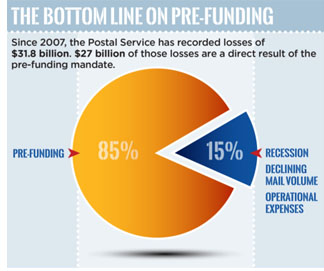NATIONAL
Congress broke U.S. Postal Service, and now must fix it
By DAVID GROVES
The Stand
(Feb. 7, 2013) — With the announcement of a plan to end Saturday mail delivery, many Americans are becoming aware for the first time about the Postal Service’s slash-and-shrink approach to managing its budget deficit. Judging by most reports in the commercial press, the root cause of the cuts the obsolescence of U.S. Mail and the fact that more people correspond and pay bills online these days.
Not so. Although declining mail volume has negatively impacted the USPS bottom line, that’s not what is forcing the dramatic cuts of Saturday service and closure of thousands of post offices and processing facilities here in Washington state and across the country.
 The real cause of the agency’s fiscal problems is the unique congressional requirement — the Postal Accountability and Enhancement Act (PAEA) of 2006 — that USPS prefund retirement benefits for decades into the future, including for employees that haven’t even been hired yet.
The real cause of the agency’s fiscal problems is the unique congressional requirement — the Postal Accountability and Enhancement Act (PAEA) of 2006 — that USPS prefund retirement benefits for decades into the future, including for employees that haven’t even been hired yet.
No other entity in America — public or private — bears this burden. Since the PAEA took effect in 2007, the Postal Service has been required to pre-pay some $5.5 billion per year. Yet the same law prohibits the Postal Service from raising postage rates to cover the cost.
The PAEA was passed in a lame-duck session of Congress by a Republican-controlled U.S. House and Senate — just days before Democrats were to assume control of the Senate — and signed into law by President George W. Bush. Many believe that the prefunding requirement coupled with the restrictions on raising postage rates were a deliberate attempt to undermine the fiscal solvency of the agency and promote the privatization of mail and package delivery.
Congress has had the opportunity to fix this problem, but has failed to act. A year ago, in her column in The Stand, Jo Ann Pyle, President of the National Association of Letter Carriers (NALC) Branch 79, warned that cutting services would not save the USPS, but legislation before in the last Congress would.
The path to survival is not eliminating the service the American public has grown to count on. Closing post offices, reducing delivery standards and cutting out a day of delivery does not make sense. Rural communities, small businesses and older Americans rely on the Postal Service six days a week.
 But the austerity-minded Congress has failed to act, and the slash-and-shrink approach continues. The USPS has now closed 13,000 post offices or drastically reducing hours of operation, slashed its workforce by 28% — killing 193,000 family-wage jobs — and shuttered more than 200 mail processing sites while downgrading its standards for mail delivery to America’s homes and businesses.
But the austerity-minded Congress has failed to act, and the slash-and-shrink approach continues. The USPS has now closed 13,000 post offices or drastically reducing hours of operation, slashed its workforce by 28% — killing 193,000 family-wage jobs — and shuttered more than 200 mail processing sites while downgrading its standards for mail delivery to America’s homes and businesses.
As reported yesterday at The Stand, NALC President Fredric Rolando has condemned Postmaster General Patrick Donahoe’s plan to end Saturday mail delivery beginning Aug. 5 as a “disastrous idea that would have a profoundly negative effect on the U.S. Postal Service and on millions of customers.
Postal Workers (APWU) President Cliff Guffey adds:
USPS executives cannot save the Postal Service by tearing it apart. These across-the-board cutbacks will weaken the nation’s mail system and put it on a path to privatization.
The AFL-CIO is urging Congress to develop a real reform plan that gives the Postal Service the freedom to grow and innovate in the digital era. Said AFL-CIO President Richard Trumka in a statement:
Ending Saturday mail delivery negligently tears at a piece of the American fabric that has existed since 1863. It is sorely misguided and ignores the responsibility Congress holds for wrecking the USPS finances in the first place. This move would not only eliminate more jobs at a time when Americans need them most, but it would also have a huge impact on the millions of customers who rely on mail delivery, including small businesses that need mail for accounting and commerce transactions, and rural communities where mail is still the major form of communication. We may live in a digital age, but the elderly and the disabled, as well as the working poor, often don’t readily have access to information other than through the delivery of their mail.
Mike Hall of AFL-CIO Now contributed to this report.





